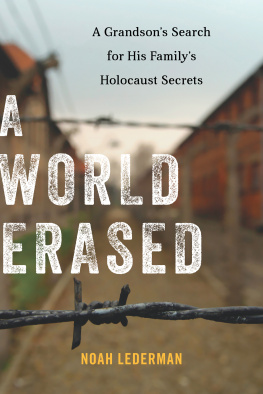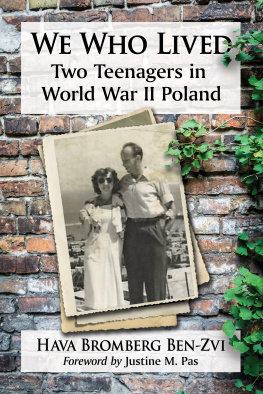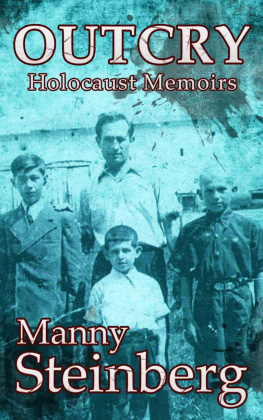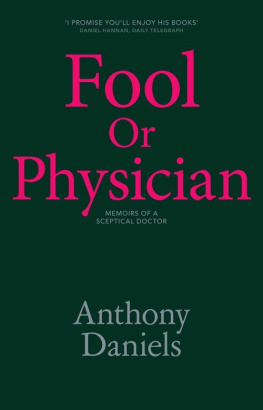A Physician Under the Nazis
Memoirs of Henry Glenwick
Edited by David Glenwick
Foreword by Thane Rosenbaum
Hamilton Books
A member of
The Rowman & Littlefield Publishing Group
Lanham Boulder New York Toronto Plymouth, UK
Copyright 2011 by
Hamilton Books
4501 Forbes Boulevard
Suite 200
Lanham, Maryland 20706
Hamilton Books Acquisitions Department (301) 459-3366
Estover Road
Plymouth PL6 7PY
United Kingdom
All rights reserved
Printed in the United States of America
British Library Cataloging in Publication Information Available
Library of Congress Control Number: 2010931126
ISBN: 978-0-7618-5136-3 (paperback : alk. paper)
eISBN: 978-0-7618-5137-0
 The paper used in this publication meets the minimum requirements of American National Standard for Information SciencesPermanence of Paper for Printed Library Materials, ANSI/NISO Z39.48-1992.
The paper used in this publication meets the minimum requirements of American National Standard for Information SciencesPermanence of Paper for Printed Library Materials, ANSI/NISO Z39.48-1992.
To the memory of Alexander Sholom Gliniewiecki (1938-1942),
who didnt have a chance
D.G.
Foreword
The memoirs of those who survived the Holocaust have, over the years, grown to produce a critical mass of reflections on mass murder. Now we have the contribution of Henry Glenwick, in a wonderful book edited by his son, David.
Leo Tolstoy wrote: Happy families are all alike; every unhappy family is unhappy in its own way. So much for families, but what of those for whom happiness and unhappiness are no longer descriptively relevant, where the range of emotion swings far more radically in one direction on the dial meter of sorrow, where there are descending states of melancholy and no ladders of recovery? Sadness is not quite sad enough and yet lasts an eternity; black is no longer the darkest shade on the palette of the human psyche.
Happiness and whatever is its opposite apply to ordinary events and the people who live them. These measurements have little meaning in the world of atrocity.
Hundreds of thousand of Holocaust survivors each witnessed barbarism and inhumanity on a grand scale. If unhappiness is a guarantee to its own equivalent uniqueness, then what does an intimate familiarity with madness ensure? What Holocaust survivors saw was unspeakable, and yet many chose to write down their memories, trying to capture in words and sentences observations and feelings that have no true human vocabulary.
Why would anyone wish to relive that level of trauma, to force the mind to give voice and shape and image to the monstrous and grotesque? Part of the improbable miracle of survivalthe returning to the world of the livingis that it required a severe compromising of self-awareness: In order to start over, the past must become archived in a warehouse of memory that permits little or no private access. There is a forbidden line of demarcation on the conscience and consciousness. Its not the same as forgetting. It is simply memory in relief, the eclipse of any useful recollection.
What we have learned from survivors is that this survival technique lasted only so long. The ability to hold off the memories eventually faded. And what returned was a furious form of remembrance.
The result brought thousands of oral history projects and hundreds of memoirs. Together they stand not only as deeply affecting tributes to human loss and grief but also as monuments of human fortitude and resilience. They are acts of witness and testimony, a transcriptionboth oral and writtenthat has the transcendent aim to both remember the dead and remind the future of what is inhumanly possible.
Primo Levi wrote: No words can be used to describe this offense, the demolition of a man. One of the worlds greatest memoirists acknowledged his own limitations when it came to recording the indescribable. And yet he tried and produced a masterpiece.
Like Primo Levi, who was an Italian chemist, Henry Glenwick was first a scientist and physician before he became a victim of the Holocaust. The clinical mind of a man trained to recognize and relieve sickness makes for an acutely observant, if not emotionally detached, chronicler of pathologies too vast and unfathomable for Petri dishes and microscopes. And yet, in a calmly reflective voice, almost standing outside of himself, Henry Glenwick has told the world his story. Somewhere within these pages rests the diagnosis of a man who traveled back and forth and yet, in the end, was determined to take one final look.
Thane Rosenbaum
Acknowledgments
A number of persons have contributed meaningfully to the publication of these memoirs and merit my deepest appreciation. To all of you, I am extremely grateful: Pavel Ilyin and Lucy Meyerovich of the United States Holocaust Memorial Museum, for the invaluable map; Thomas Heffernan of Robert Cook Associates and Jean Nudd of the United States National Archives, for the illuminating genealogy; Thane Rosenbaum, for his insightful and reflective foreword; Tracy Prout, Anne Leicht, Maria Barbieri, and Margaux Bruzzese for their responsive and unfailingly good-humored typing assistance; Samantha Kirk, my editor at Hamilton Books, for her wise guidance and combination of gentle prompting and flexibility; and Susan Cane, for her unflagging support and perceptive suggestions. My thanks for helping to make this a much richer work than it otherwise would have been.
Finally, my son, Michael, and my mother, Celia, deserve especial, heartfelt mention, both for their encouragement of this effort and for beingby his embracing of possibility and her indefatigability of spiritconstant sources of inspiration to me.
David Glenwick
Editors Introduction
A Physician Under the Nazis had its genesis as oral history, being the product of a series of interviews that I, then a graduate student in psychology, conducted with my father in the early 1970s. Following the transcription of the interview tapes, my father supplemented the material with further detail and observations, and I provided additional editing for readability. In the years since then, the manuscript has circulated among relatives and friends, helping to illuminate one familys history within the context of the Holocaust.
Rereading these memoirs more than three decades later, with an awareness of the survivor generations imminent passing from the scene (my father having died in 1995), I believe that they possess interest and value beyond their original intended audience. It has been noted that all Holocaust survivors stories are, in a sense, the same but that each is unique in its own telling. In the present work may be found the combination of luck, acts of kindness (by both Jews and non-Jews), and resourcefulness that is common to most survivor accounts. At the same time, its depiction of a Jewish physician who served in succession both the Russian Communists and the Nazis provides a distinctive window on the Holocaust experience.
One of my ongoing research interests as a clinical psychologist has been the effects of stress on behavior, as well as the ways in which people attempt to cope with, and moderate the impact of, stressors and trauma. This research, carried out within a traditional scientific framework, has been primarily quantitative in nature. Narratives, such as the present volume, serve as a complement to such data-based approaches. By offering first-person perspectives on facing adversity, they provide an alternative, but equally valid, way of knowing.
In editing the manuscript for publication, my aim has been to increase its accessibility to a general readership without altering its content, voice, and meaning. I hope that readers will indeed find meaning in the personal history and reflections contained in the following pages.








 The paper used in this publication meets the minimum requirements of American National Standard for Information SciencesPermanence of Paper for Printed Library Materials, ANSI/NISO Z39.48-1992.
The paper used in this publication meets the minimum requirements of American National Standard for Information SciencesPermanence of Paper for Printed Library Materials, ANSI/NISO Z39.48-1992.